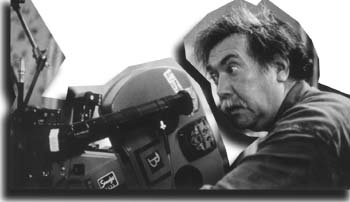Making up the Past
In 'Three Lives and Only One Death,'
By Michael S. Gant
THAT THE TITLE of the new French film Three Lives and Only One Death doesn't mesh with its own plot--the "three" should be at least a "four"--hints at director Raúl Ruiz's opinion of logic. The exiled Chilean filmmaker, who has worked in Europe since the fall of Allende, applies liberal doses of anything-goes whimsy to this episodic comedy about multiple personalities.
Marcello Mastroianni, holding his hammier tendencies relatively in check, plays a series of characters who may all be one and the same. He appears first as Mateo Strano, who regales a man named Andre (Feodor Atkine) with a bizarre tale.
Twenty years ago, Strano swears, he was married to Andre's wife; one day, he vanished without warning, renting a nearby apartment inhabited by magical sprites. From this redoubt, Strano spied on his neighbors--speeding up, slowing down and even freeze-framing their lives (not unlike a film director, say).
Mastroianni's second "life" is as an anthropology professor who suddenly abandons the Sorbonne to become a beggar, who ends up married to a prostitute (Anna Galiena), who turns out to be a businesswoman, who is stalked by her sinister stammering husband (Jacques Pieillier, looking like Spalding Gray gone feral) in a roundabout homage to Belle de Jour.
And at this point, the story starts to pirouette into a recursive labyrinth of confusion. A Pavlovian butler befriends, then haunts, a young couple; a corporate tycoon's empire is threatened by the arrival of some nonexistent relatives. Characters from the first two segments start to overlap in time and space, until everyone is somehow connected to the single man whose protean imagination has willed them all into being.
The interlacing tales are cobbled together by a voice-over delivered by a man in a radio studio, a device suggesting that Three Lives and Only One Death is a meditation on the conjuring power of the imagination. Remembering is a creative act, not a process of documentation, hence Mateo's remark that although he once snapped hundreds of pictures to record his happiness, "the more photographs I took, the less I recognized myself." In the instant in which the present becomes the past, truth ceases to be objectively measured and is freed up for the capers of individual reverie.
In his disdain for narrative determinism, Ruiz owes a debt to Buñuel, but his surrealism bears no sting--it's baffling but never pointed.
Even in the midst of absurdity rampant, we look for a dream logic of sorts, but Three Lives and Only One Death remains an unsolved puzzle not worth the effort of putting its scattered pieces together.
[ Metro | Metroactive Central | Archives ]
This page was designed and created by the Boulevards team.

He Is a Camera: Exiled Chilean director Raúl Ruiz at work on his surrealistic fantasy "Three Lives and Only One Death"
to remember is an act of creation
Three Lives and Only One Death (Unrated; 124 min.), directed by Raúl Ruiz, written by Ruiz and Pascal Bonitzer, photographed by Laurent Macheul and starring Marcello Mastroianni.
From the December 19-25, 1996 issue of Metro
Copyright © 1996 Metro Publishing, Inc.
![[Metroactive Movies]](/movies/gifs/movies468.gif)